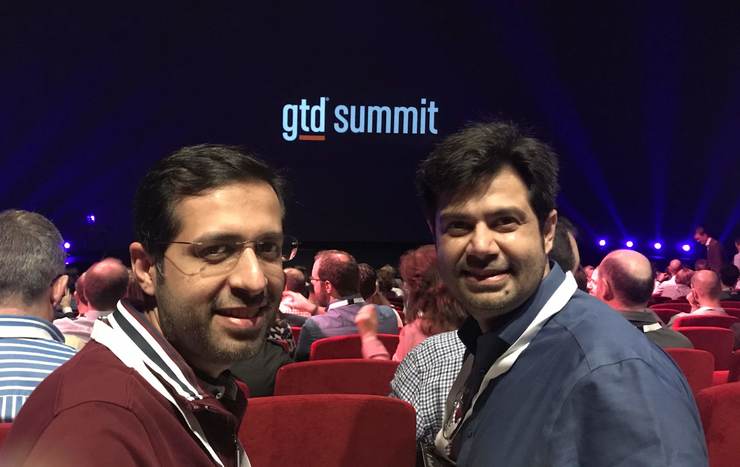We just returned from the GTD Summit in Amsterdam. A heart-warming event that celebrated everything GTD and what Mind Like Water can accomplish.
Practicing GTD for a decade and a half the Summit brought closure on several open loops on GTD.
Arif’s top highlights from the Summit:
- The flawless artistry how the event was conducted. The moderation, introduction of the speakers, the exquisite interludes between speakers, the jaw-dropping nature videos left us just mesmerized.
- Connecting with the origins of GTD. David held a panel with his mentors Dean Acheson and Russel Bishop. Both of whom provided the inspiration even the core models of GTD. Hearing them speak and connecting with them later off-stage provided me insight on how the masters think.
- The talks on GTD for Schools by Mike Wallace and the panel by GTD for families by Eric Mack, Wendy & Mike Williams was encouraging and foretelling of the path that partaking of this methodology will take.
- A plethora of tidbits from the spectrum of speakers that will to continue to shape my growth and teaching
- Finally, it was just super cool connecting with old friends and making new ones
Ali’s Key Takeaways:
When you self-organize exclusively and explicitly around the work for purpose, the power-shift the rules, these 5 things show up:
https://twitter.com/encodeorg
1. Psychological safety
2. Dependability
3. Structure and clarity
4. Meaning
5. Impact
How old would children need to be for GTD?
https://twitter.com/MarkBWallace
As soon as they are old enough to understand how to plan Christmas.
https://twitter.com/cduhigg
How do we get groups to change their habits?
Think in terms of:
1. “How do we reward groups to change their behavior?”
2. “How do we make them aware of their cues in such a manner that we can change together?”
Always being connected undermine intellectual productivity, creativity, well-being.
Theo Compernolle MD., PhD.
The problem is not the ability to be connected, but the state of being connected.
Solution? Batch-tasking
1 Reflection batch:
2 Message batch
3 Conversation batch
4 Get things done
5 Family batch
Key principles for taking awesome breaks:
https://twitter.com/DanielPink
1. Something is better than nothing.
2. Social is better than solo
3. Moving is better than stationary
4. Fully detached is better than semidetached
5. Being in nature, better than being outside
Click here to view all the session summaries
I believe our work should be an expression of our most creative selves. I work with business owners and their teams to achieve stress-free productivity.

